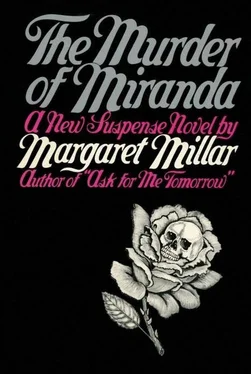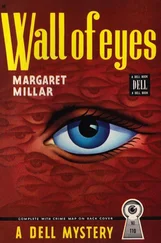“And on the heels of that one we come to still another. Dalmane, as I said before, is available by prescription only in fifteen-milligram orange and ivory capsules or thirty-milligram red and ivory. Dr. Albert Varick, Mrs. Young’s personal physician, is attending a medical conference in Puerto Rico this week but we have his sworn statement available for you to read. The gist is as follows: From time to time Dr. Varick has prescribed various medications for Iris Young, mainly Indocin, to alleviate the pain of her chronic arthritis. But according to his records and Iris Young’s medical file, Dr. Varick never issued her a prescription for Dalmane. Yet there was such a prescription in that house. A police sergeant will give you the details about it later.
“Now, before calling my first witness, Admiral Cooper Young, I feel you should be told in advance that Admiral Young did not wish to testify and so stated when he was served with a subpoena. He cannot by any means be called a hostile witness, but he is a reluctant one, agreeing to testify only because he believes it’s his duty to assist in the enforcement of the law. Please bear this in mind as you listen to him.”
The Admiral moved to the witness stand with the brisk no-nonsense walk he’d learned at Annapolis fifty years previously. He gave the appearance of wearing a uniform, though it was only a dark grey suit with a white cuff-linked shirt and black tie and shoes. His face had the slightly jaundiced color that accompanies a fading suntan.
His reluctance to testify would have been apparent to the jury without any previous warning. He glanced at them with obvious distaste before responding to the District Attorney’s first question.
“Will you state your name and address for the record, please?”
“Cooper Randolph Young, 122 °Camino Grande, Santa Felicia.”
“And your occupation?”
“Vice-Admiral, United States Navy, Retired.”
“What was the nature and duration of your relationship with Iris Van Eyck Young?”
“She was my wife for thirty-five years.”
“Was it a happy relationship?”
“Yes.”
“Would you say that your household was, by and large, a congenial one?”
“Yes.”
“I realize this must be a painful experience for you. I wouldn’t have asked you to go through it if it weren’t necessary. Do you understand that?”
“I hear you talking.”
“I can’t very well apologize for doing my duty, Admiral.”
“No. Such an apology would not be accepted anyway.”
“Very well, let’s proceed. Would you tell the jury where you were in the late afternoon and early evening of July the Fourth of this year?”
“At home with my family — my wife and my two daughters.”
“Anyone else in the house?”
“Mrs. Norgate, our housekeeper, who was cooking dinner.”
“And Mrs. Shaw?”
“Yes.”
“What was Mrs. Shaw doing?”
“I’m not sure, but she was probably fixing the table for dinner, arranging the centerpiece, the flowers, and so on.”
“And candles?”
“And candles, yes.”
“Were your dinners usually formal?”
“Yes, as part of my daughters’ social education.”
“Was there anything different about the dinner that night?”
“It was quite a bit earlier than usual because Mrs. Norgate had an engagement and I had promised my daughters to take them to a display of fireworks at the club. Mrs. Shaw was invited to go along but she refused.”
“She refused on what grounds?”
“She didn’t want to leave Mrs. Young alone.”
“But she did leave her alone.”
“Only to walk the dog.”
“That was long enough, wasn’t it?” The D.A. glanced pointedly at the table of exhibits. “Wasn’t it?”
“Mrs. Shaw is not responsible for what happened. She was always very gentle and kind to my wife.”
“And vice versa?”
“And vice versa, yes.”
The District Attorney had been sitting back in his chair until this point in the questioning. Now he leaned forward and wrote on the legal pad in front of him, And vice versa?!
“Did you know Mrs. Shaw before you hired her, Admiral?”
“Yes. She and her husband were members of the same beach club my wife and I belonged to. All four of us knew each other, though not very well.”
“What was the name of the club?”
“The Penguin Club.”
“That’s pretty well restricted to people in the upper financial brackets, isn’t it?”
“Yes.”
“Was Mrs. Shaw still a member when she came to you seeking employment?”
“She was not a member and she didn’t come to me seeking employment. The possibility of such a job was suggested to her by Miss Brewster, the club secretary, who then spoke to me about Mrs. Shaw’s predicament.”
“Predicament?”
“Her husband had died leaving a great many debts.”
“And so you took her into your house, like a good Samaritan?”
“No, not like that at all. My wife and I needed help with our daughters.”
“Would you care to elaborate on that?”
“No.”
“All right. Now—”
“Am I permitted to make a statement?”
“Go ahead.”
“I want to protest my two daughters’ being given subpoenas to testify.”
“Do you have any reason to object to their testimony, Admiral?”
“I simply feel they’re not equipped to deal with stressful situations like this.”
“They’re of legal age, are they not?”
“Yes.”
“And represented by legal counsel?”
“Yes, but they won’t listen to his advice.”
“I talked personally with both your daughters and they exhibited no signs of stress and no aversion to testifying. Your paternal concern is admirable but perhaps not justified in this instance.”
“I have registered my protest.”
“It will be on the record, Admiral... Now, when did Mrs. Shaw start working for you?”
“Sometime in January.”
“Did she fit in well with the other members of your household?”
“Yes.”
“Right from the start?”
“There was the usual period of adjustment under such circumstances.”
“What was your own relationship with Mrs. Shaw?”
“Relationship?”
“Was it strictly one of employer and employee?”
“She was an employee certainly but I considered her more like a friend. And vice versa, I believe.”
“You were friends?”
“Yes.”
“More than casual friends?”
“We were friends.”
“Close friends?”
“No, I wouldn’t say we were — look, she lived in my house, we saw each other every day, we talked, we ate at the same table. What does that make us?”
“A good question, Admiral.”
Once again the District Attorney leaned forward to write on the yellow pad in front of him What does that make us? He didn’t hurry. He wanted to be sure the jury had plenty of time to supply their own answer to the Admiral’s question.
“Tell me, Admiral, did Mrs. Shaw go out socially?”
“What exactly do you mean?”
“Did she have dates?”
“I don’t know.”
“What percentage of her evenings would you say she spent at home? Fifty percent?”
“I didn’t keep track.”
“Seventy-five percent? Ninety percent?”
“She spent most of her evenings in the house with the family. Dinners usually lasted until quite late because they were, as I said before, part of my daughters’ social education.”
“You and your wife, your two daughters and Mrs. Shaw, was this a happy group?”
“Happy is a pretty strong word.”
“I agree, happy is a pretty strong word. I’ll amend the question. Did the five of you get along in a reasonably civilized manner?”
Читать дальше







![Маргарет Миллар - Rose's Last Summer [= The Lively Corpse]](/books/384369/margaret-millar-rose-s-last-summer-the-lively-c-thumb.webp)



![Маргарет Миллар - The Iron Gates [= Taste of Fears]](/books/433837/margaret-millar-the-iron-gates-taste-of-fears-thumb.webp)